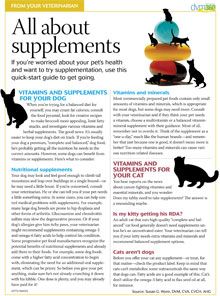Veterinary supplements: The uncertainty of the add-ons?
Help clients navigate the murky information about supplements and keep their pets feeling their best.
There is a mountain of information-some reputable, some not-about supplements and their use in pets. And while a pet owner has the best intentions, something in that nutraceutical could make a pet sick. Help clients out by reading through this Q&A with Alice Jeromin, RPh, DVM, DACVD, and download this handout as a guide.

How often do clients ask about oral dietary supplements, nutraceuticals or probiotics for their pets?
Probably 30 to 50 percent of my clients ask about supplements. Most of the time they've purchased them first via Internet advice and then ask me about them after! As we all know, there is a lot of incorrect information on the Internet, since most retailers want to sell their products, so I think owners need guidance about these products-which companies are reliable, and the few that have been tested to ensure what is listed as in the product is actually in it.
Do you recommend only veterinary-specific sources, or do you also recommend over-the-counter products?
I tend to use veterinary-specific products, particularly those that have some science or independent studies behind them. I recommend over-the-counter products only if I know they're made in the United States and are approved by consumerlab.com. This independent agency tests most nutraceuticals and some veterinary products. It costs $35 per year for access to their information and results, and that funds their research.
Do you offer clients any warnings about the use or dosing of these products?
Because of the explosion of herbal products, I inquire about any medications or supplements the patient is receiving. I'm particularly interested as an allergist-if an owner is giving a dog alfalfa tablets and I have allergy tested the dog and found grass allergies-this may interact and make the dog's allergy signs worse! There are examples in human and veterinary medicine where patients are on prescription medications and taking herbal preparations and drug interactions occur, including disruption of coagulation. Some imported human supplements have been found to contain active ingredients such as amphetamine, ephedrine, sildenafil (Viagra) or caffeine-none of which are listed on the label, which is usually why they give some sort of “desired” effect.
Do you stock products you recommend, refer clients elsewhere, or both?
I stock a few nutraceuticals-the ones with some research behind them. For the ones I don't stock, I will make specific recommendations. For example, probiotics are species-specific-dog probiotics work for dogs, cat probiotics for cats, human ones for humans, etc. In one study, 90 percent of over-the-counter probiotics did not contain what the label claimed. Most owners aren't aware that with probiotics, the more bacteria in the product, the more they cancel each other out.
Dr. Alice Jeromin is a pharmacist and veterinary dermatologist in Cleveland, Ohio. She is a 1989 graduate of the Ohio State University College of Veterinary Medicine, 1977 graduate of the University of Toledo College of Pharmacy and an adjunct professor at Case Western Reserve University's College of Medicine.
Episode 67: Choosing trusted supplements
October 20th 2021In this episode of The Vet Blast Podcast, Dr Adam Christman chats with Dr Janice Huntingford about the latest insights into selecting the best supplements for your patients, including the importance of recommending and utilizing products that have a substantial amount of science and research behind them. (Sponsored by Vetoquinol)
Listen